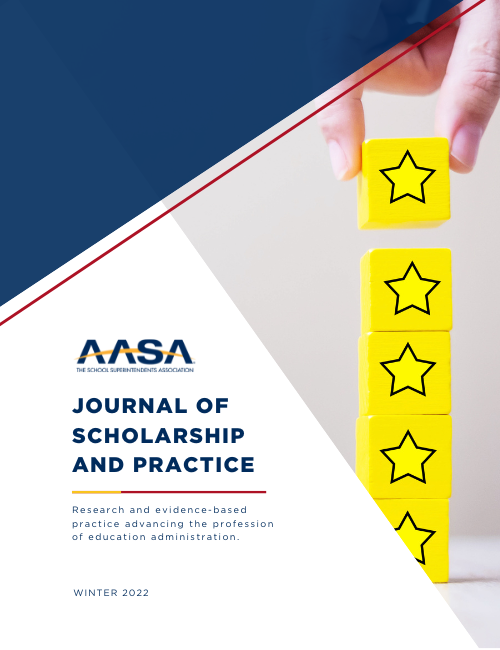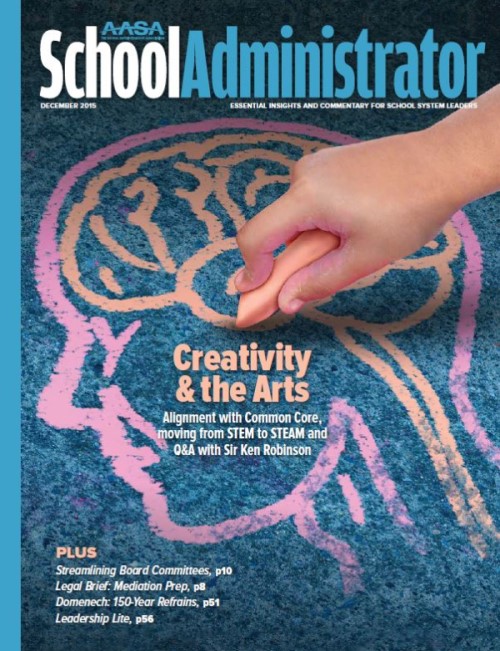2022 Winter Journal of Scholarship and Practice

The theme for this issue was developed by Editor Ken Mitchell around the notion of ratings and rankings and the illusions of student measurement without context. “Americans like to rank,” he says, adding “We like standings. We assign scores—numerical ones—to sort and select our favorites, best, and worst. We make decisions based on polls that rank songs, movies, restaurants, places to live or retire, and colleges to attend. We form judgments on ratings and rankings.”
Students and systems are not immune from judgment from many sectors. Time and money are invested. Profits are made. Lives are altered. Arguably when a system has narrowed its priorities to raise test scores, other learning opportunities are abandoned.
It is the editors’ contention that there is a lost generation of school leaders whose students would benefit from a reexamination and recalibration of how school systems collect student performance data. What are the stories behind the numbers that might reveal what they really mean? How do the details behind the stories help us to better understand the root causes of learner struggles and failures in and out of the classroom?
The stories are important. Measurement without context will produce illusions of success as well as failure, contributing to a continuation of cycles of blame and regressive pedagogy.
The contributors to this volume offer alternative measures to get to the stories behind the numbers. The issue begins with Tom Guskey and Laura Link’s research “Feedback for Teachers: What Evidence Do Teachers Find Most Useful? that provides evidence to support the benefits of mastery learning as a means to higher levels of achievement and student confidence levels than traditional approaches.
A study of competency-based education (CBE) is this volume’s second piece and is titled “Transitioning from a Traditional Educational Model to a Competency-Based Educational Model: Lessons Learned from Administrators.” The study was conducted by a team of researchers from the Universities of North and South Dakota—Kraig Steinhoff, David De Jong, Susan Curtin, Steven Chesnut and Cory Steiner. The study cited CBE as an effective instructional alternative and offer superintendent guidance in making the transition to a competency-based model.
In the concluding article, Luke Green, a doctoral researcher, challenges the use of grade point averages in “[GPA] in, [GPA] out: Uncovering Inequity and Flaws in Grading Policies.” Describing the negative effects and inequities in GPA-oriented grading policies, he encourages school leaders to engage their students: “Simply ask any student for an example of what they feel is unfair or unhelpful about the ways that they are assessed. The willingness to fully listen to their experiences unfortunately does not always materialize, as legitimate grievances are quickly dismissed by administrators and faculty.” Green promotes the importance of learning the stories beneath the numbers.
Advertisement
Additional Articles
-
 Ratings and Rankings: The Illusions of Student Measurement without Context
Ratings and Rankings: The Illusions of Student Measurement without ContextWe like to keep score, even though how we measure often fails to reveal truths about the quality of the rating.
-
 Feedback for Teachers: What Evidence Do Teachers Find Most Useful?
Feedback for Teachers: What Evidence Do Teachers Find Most Useful?This study investigates teachers’ perceptions of three types of feedback on students’ performance to guide instructional improvements.
-
 Transitioning from a Traditional Educational Model to a Competency Based Educational Model: Lessons Learned from Administrators
Transitioning from a Traditional Educational Model to a Competency Based Educational Model: Lessons Learned from AdministratorsThis study examined why schools and districts transitioned from traditional education systems to competency-based, the challenges and benefits
-
 [GPA] in, [GPA] out: Uncovering Inequity and Flaws in Grading Policies
[GPA] in, [GPA] out: Uncovering Inequity and Flaws in Grading PoliciesThe reduction of the student experience to a GPA launders both meaningful nuance of how course grades are assigned as well as potential evidence of inequitable grade distribution.
Advertisement
Advertisement



